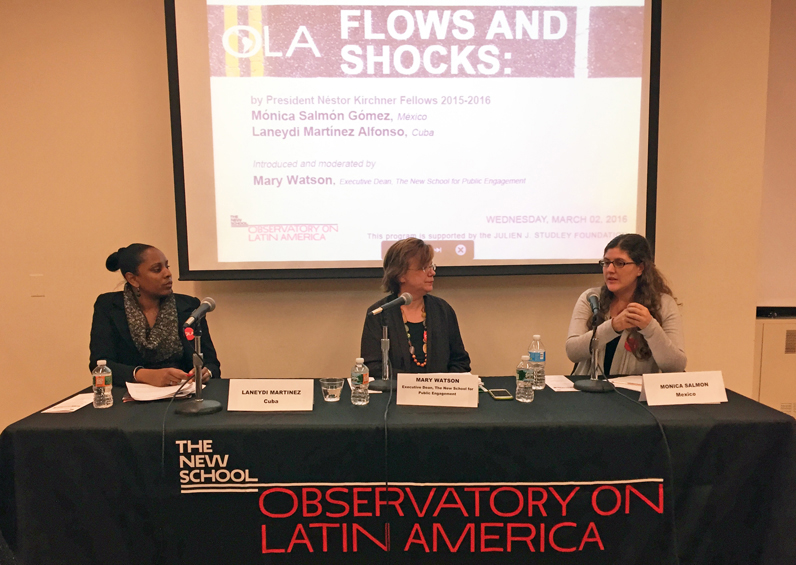
Young Latin American Leaders Talk ‘Flows and Shocks’
In 1940, in the midst of Nazi Germany’s invasion of Europe, Julien Studley and his family fled their native Belgium to France and later to Cuba. Living in Havana proved to be a transformative experience for the adolescent Studley: For the first time in his life, Studley, a Polish Jew, no longer felt ostracized because of his ethnicity.
The experience also sparked a lifelong interest in international, particularly Latin American, affairs. In 2006, as a trustee of The New School, Studley made a donation to the university to help launch the Observatory on Latin America (OLA), an institute that creates opportunities for public debate on hemispheric processes of reform and change.
It was with great sadness that the New School community learned of Studley’s passing late last year. While he couldn’t be there in person, Studley was certainly there in spirit for “Flows and Shocks: Migration Networks and Economic Cycles in Latin America,” an OLA-hosted lecture featuring presentations from the spring 2016 President Néstor Kirchner (PNK) Fellowship awardees.
“Julien spent many hours talking to us about his understanding of ethnicity, partly through the lens of the experience he had in Cuba,” Mary Watson, executive dean of the Schools of Public Engagement, told a crowd packed into the Klein Conference Room last week. “He had the deepest love for Latin America, the OLA, and the Julien J. Studley Graduate Program in International Affairs. We honor his legacy in this lecture tonight.”
At “Flows and Shocks,” The New School welcomed spring 2016 PNK fellows Mónica Salmón Gomez, graduate of the University of Guadalajara, Mexico, and Laneydi Martínez Alfonso, professor and researcher from the Center for Hemispheric and U.S. Studies at the Havana University, who presented the research they had pursued, in part, during their two-week stay at The New School. The PNK Fellowship is awarded by OLA/The New School and the Universidad Nacional de San Martin, Argentina, to young professionals with an outstanding record in academia and social service.
In her talk, Salmón Gomez highlighted her work and research on transnational advocacy networks (TANs) for migrants in transit in her native country. For decades, Salmón Gomez said, the Mexican government has embraced draconian policies that have “caused the diversification of criminal activity,” including the smuggling, trafficking, and kidnapping of migrants.
“This research defines the state as perpetrator,” she said. “By not protecting the integrity of immigrants, government actors are culpable for these crimes.”
The mission of TANs is to hold the government accountable for its actions, or lack thereof, on migrants. TANs—including international and nongovernmental organizations, research groups, foundations, media, churches, and shelters—use a variety of tactics, including public shaming of state officials, to “push the government to protect human rights.”
“TANs reveal the state’s negligence, lack of institutional coordination, and corruption, which have had severe consequences for the migrant population,” she said. “TANs are getting stronger, working as a counterweight to the government and helping to shape public policy.”
During her talk, Martínez Alfonso discussed the “transmission of economic shocks” from the U.S. economy to Latin America and the Caribbean countries. Historically, market conditions inside the United States have had a profound, and sometimes deleterious, impact on the economies of its southern neighbors. However, from 2002 to 2012, Martínez Alfonso said, “the growth differential between the United States and the Caribbean has been positive”—a reflection of the diminished impact of economic changes in the United States on Latin American and Caribbean countries.
Martínez Alfonso pointed to the resilience demonstrated by Latin American and Caribbean countries during the global economic crisis.
“The recession questioned the idea that whatever happens in the U.S. economy has a direct impact on Latin America,” Martínez Alfonso said. “In 2008, the economy of the entire region slowed down, but,” due, in part, to the increasing internationalization of Latin American companies as well as China’s growing influence as a trade partner with the region, “the recovery in the Caribbean was actually faster than that of the United States.”
Flows and Shocks was just the sort of engaging discussion that makes The New School a hothouse for critical intellectual inquiry.
“At The New School, we create an open space for dialogue on and use research to address the world’s pressing social issues,” Watson said. “Julien Studley was always a generous supporter of this idea.”